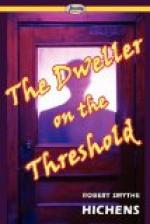“Well, what if I was?” snapped the professor, moving in his chair.
“Marcus Harding could not make a move to get rid of me. There was a link between us which he could not even try to break.
“One night—one night—I discovered what that link was.”
It was growing dark in the room. The Rossetti Madonna, thin, anemic, with hanging hair, seemed fading away on the somber, green wall. The window-panes looked spectral and white. The faint murmur of the city sounded a little deeper and much sadder than in the light of day. Stepton was aware of a furtive but strong desire for artificial light in the room, but he did not choose to mention it. And Chichester, whose voice—so it seemed to his hearer—began to have that peculiar almost alarming timbre which belongs to a voice speaking not for the ears of another, but for the satisfaction only of the soul which it expresses, continued his narrative, or confession, as if unaware of the dying of day.
“During the day which preceded it I had been haunted by the thought of myself doing what Marcus Harding could not do. Why should not I of my own will leave St. Joseph’s, get away from this dreadful contemplation which obsessed me, from this continual anxiety—almost amounting to terror at moments—which gnawed me? Why should not I break this mysterious link, impalpable yet strong? If I did, should I not again find peace? But my sittings with Marcus Harding would be at an end. Could I give them up? I asked myself that, and I felt as if I could not. Through them, by means of them, I felt as if I might attain to something wonderful—terrible perhaps, but wonderful. I felt as if I were approaching the threshold of absolute truth. A voice within me whispered, ‘Go no further.’ Was it the voice of conscience? I did not heed it. Something irresistible urged me forward. I thrust away from me with a sort of crude mental violence the haunting thought. And when the darkness came I greeted it.
“For he came with the darkness.”
On the wall opposite to the professor the thin Madonna faded away.
“As I heard his heavy step on the stairs that night I said to myself, ’At all hazards I will see, I will know, more. I will see, I will know—all.’ When he entered at that door”—a thin darkness moved in the darkness as Chichester pointed—“he was dreadfully white and looked sad, almost terrified. He suggested that we should break through our plan and not sit. I refused. He then said he wished to sit in light. I refused. He was become my creature. He dared not disobey my desires! We placed our hands on this table, not touching. I could no longer endure the touch of his hand. We remained motionless. A long time passed. There were no rappings. A strange deadness seemed to prevail in the room. Presently it faded away, and I had the sensation that I was sitting quite alone.




